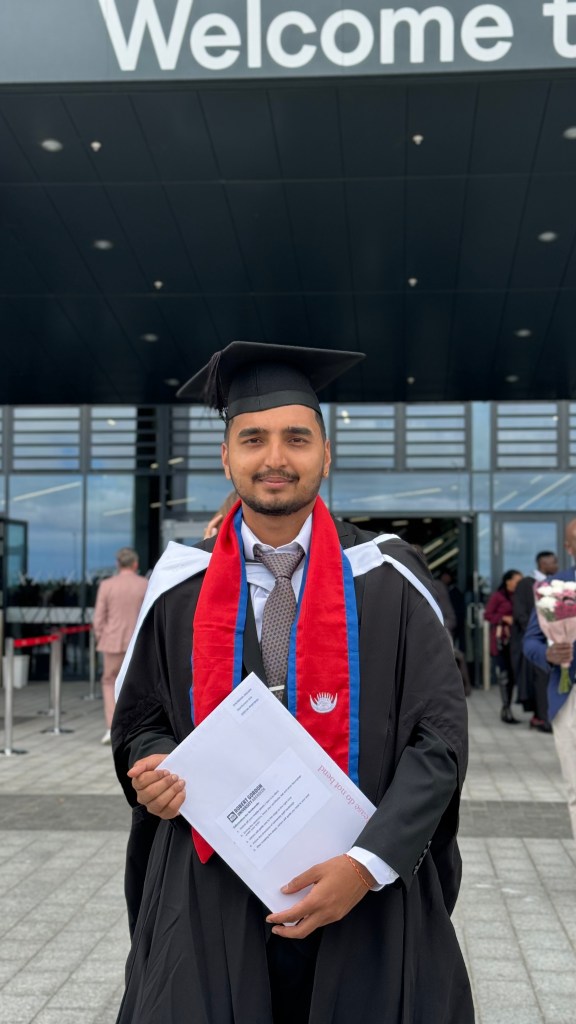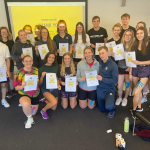
Meet Shuvam Dhungana, an RGU alumnus currently working in the Communications department at Norfolk and Norwich University Hospitals NHS Foundation Trust in England. Originally from Nepal, Shuvam’s academic journey took him to RGU in Aberdeen, Scotland, where he pursued his master’s degree in journalism.
His experience at RGU not only helped him develop practical journalism skills but also shaped his career path in the UK. In this interview, Shuvam shares his inspiring journey from student life to securing a job even before graduation.
Why did you choose to study at RGU?
I moved to Aberdeen in 2022 to pursue my master’s degree in journalism. While searching for journalism courses in the UK, I came across RGU’s website. I was impressed with the course structure, which included multimedia journalism and provided placement opportunities for students. That practical approach was exactly what I was looking for, and it helped me decide to continue my education at RGU.
Can you share some of your memorable experiences at RGU?
My time at RGU has been incredibly memorable, filled with both learning and growth. I still recall our first multimedia class, where we learned to use mics and recorders. After an hour of theory, we were sent out to interview students and record their responses. It felt a bit awkward at first, but the hands-on experience after every class made a huge difference. From writing real-life stories, learning how to use cameras and editing software, to field visits at local press outlets and pitching story ideas to editors—it was a rich learning environment.
How did your lecturers and peers support you during your studies?
The support I received from my lecturers was amazing. We used to pitch stories in front of the entire class, and every story pitch used to be unique. I also pitched several real-time stories, including stories from Nepal, and my lecturers were always encouraging and supportive. One of my stories was even published in “The Guardian”, which was a big confidence boost. The practical nature of the course really paid off. I also had the opportunity to intern at Knit-it, where I contributed to writing blogs. This experience helped me understand the UK work culture, and it was invaluable for securing a job here.
How did you go about finding a job before graduating?
Finding a job as an international student can be challenging, but persistence is key. I initially got frustrated when I wasn’t being invited for interviews. I even reached out to our career assistance team to check if there was anything wrong with my CV. As I applied for numerous jobs, I realised over time that focusing on roles that matched my experience and skills was more effective than sending out a high volume of applications.
I started applying for jobs while working on my dissertation, particularly looking for roles in communications. After many applications and a few interview invitations, I finally secured a position. I received my dissertation results on January 25 2024, and the very next day, I had an interview. I passed, and now I’m working as a Communications Assistant at Norfolk and Norwich University Hospitals.

What does your current role as a communications assistant involve?
As a Communications Assistant, I handle various tasks. I proofread content, publish articles, interview people and departments, and write stories for our website and social media. It’s a busy role, but I really enjoy it.
What advice do you have for journalism students or recent graduates?
My advice is to be clear about the field you want to work in and apply for positions that suit your experience and skills. It might take some time, but each application makes you stronger. Start applying early, and don’t lose hope—you’ll stand out with persistence. Trust me, attending your graduation ceremony with a job in hand is an amazing feeling!
Shuvam Dhungana
Related blogs
Studying BA (Hons) Journalism at RGU – Part 1
My journalism placement with STV
The post How RGU’s Msc in Journalism helped me start my career in the UK appeared first on RGU Student Blog.



